CASE. Cycling, the big winner of the Covid-19 pandemic

La pandémie du Covid-19 a boosté le développement de la pratique du vélo. MAXPPP – Patrick Lefevre
La dernière enquête annuelle du ministère des Transports, réalisée par l’Institut CSA, confirme la tendance observée depuis 2020 : l’ambition de faire du vélo l’un des vecteurs phares de la mobilité douce s’ancre progressivement chez les Français.
The Covid-19 pandemic, which, in 2020, disrupted daily behavior in society, had at least one beneficial effect: it placed cycling at the center of encouragement to cycle. ;appropriate soft mobility. To support this development, “May by bike” was born that year, an initiative intended to "encourage the practice of this gentle mobility, both economical and affordable. rsquo;ecological, to the greatest number".
To introduce the 2024 edition, the Ministry of Transport has entrusted the CSA Institute with carrying out a major public survey on the French and cycling. Result: "nearly 40 % of French people cycle at least once a month". With a more frequent practice among men (31%) than among women (19%). Cyclists are on average younger: 34% of regular cyclists are between 11 and 34 years old, compared to 14% for 65-85 year olds.
"The main obstacle is the mechanics"
"What we need to understand is how we practice cycling on a daily basis, warns Alexandre Cayrac, president of the Vélocité Rodez Aveyron association. Good bike trips are not necessarily good car trips". Interesting element: almost one in three French people (28%) admit to having poor cycling skills.

"In fact, the main obstacle is the mechanics, many people who want to ride it often wonder if their bike is in good condition, adds Alexandre Cayrac. And yet, the French do not consider themselves clumsy, since 93% say they know how to ride a bike. "What we observe among our employees is a certain reluctance to do so because the roads have a discouraging slope", points out Franck Porier, CSR manager at Figeac Aéro, an aeronautical subcontractor based in the Lot.
The electric bike is still little adopted
The electrically assisted bicycle (VAE) could well be the ideal solution. However, as the CSA Institute survey shows, only 8% of French people have such equipment. "There is a real lack of awareness of electric bikes, people continue to think that they will always make a lot of effort", adds Franck Porier. Which does not prevent one in 4 Occitanie residents (25%) from saying they cycle "regularly". Compared to 31% in Pays de la Loire, a region where regular practice is highest.
"The great advantage of cycling is that it is like skiing, you can practice it with family or with friends& quot;, insists Jean-Charles Houeix, who manages the network of specialized Cycling stores. And it’s not just leisure that motivates investment. Since the pandemic, professional reasons have also found their place. The CSA survey shows that the practice has progressed over a year, during the week and in urban areas. While the slice "weekend" and "peri-urban and rural areas" ; tends to stagnate.
Greater professional use
Moreover, it is in the categories linked to professional activity that we find today the largest share of regular practitioners  ;: business leaders (46%), farmers (45%), artisans and traders (38%), executives and higher intellectual professions (34%). Compared to 15% for retirees and 33% for students, high school and college students.
Our entire file can be found this Sunday at 7 a.m. on Midi Libre. I subscribe to read more




